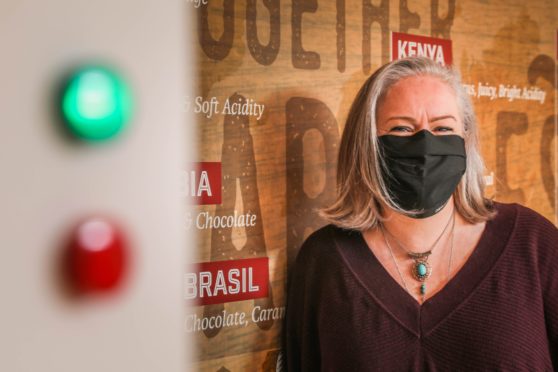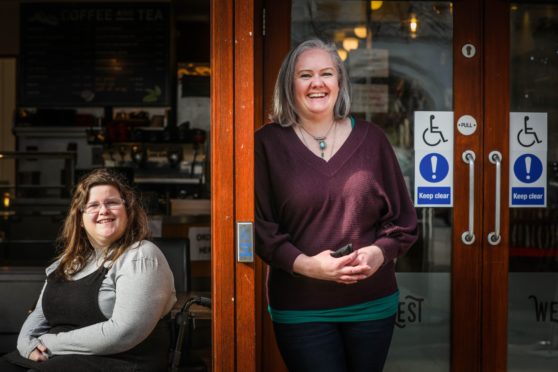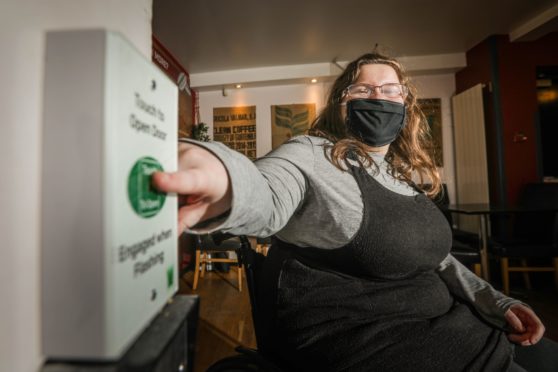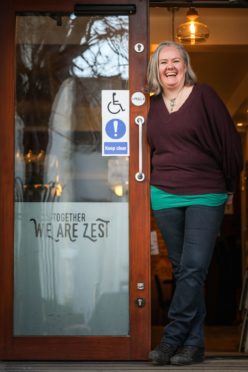As Zest prepares to open its doors to customers, owner Lisa Cathro talks through the changes she’s made to make the cafe more inclusive for staff and customers who may be suffering from disabilities, mental health issues or communication difficulties.
We Are Zest, the social enterprise cafe based in St Andrews, has been supporting customers and staff members with various disabilities and mental health issues since it opened almost 13 years ago.
Now, as it prepares to open its doors for takeaway only on April 15 and to customers fully on April 26, following its closure during the second lockdown, the cafe has undergone a change that could help improve the customer experience for good.
Owner Lisa Cathro recently made the changes to the cafe, after it became clear that her space hadn’t always been the friendliest for people with mobility issues.
She said: “We’ve always had good access for wheelchair users and a lot of our customers have disabilities because we’re kind of like a ‘safe space’ and customers know that a lot of our team have disabilities so it’s a nice and easy place for them to come.
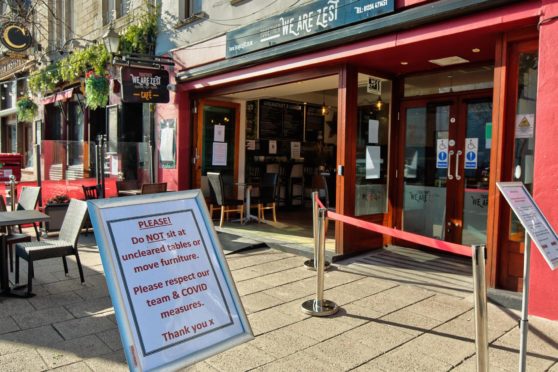
“The whole front of the shop opens out on to the street so it’s very easy to access but I was always very keenly aware that the bathroom doors are quite heavy. So if you’re an elderly customer and you’re not very strong, or you have buggies and children, or you’re in a wheelchair, it’s actually quite difficult.”
Grant
Through Fife Council’s Town Centre Improvement Fund, Lisa was able to obtain a £10,000 grant that has helped make the cafe a lot more inclusive.
“I’ve never been able to afford to make it automated because it costs so much money to put in the electronic push pad doors,” said Lisa.
“We’re a social enterprise so most of our money goes back into training and helping people with disabilities. But then Fife Council had this Town Centre Improvement Fund which is tied with Covid – businesses can alter their business and access new markets.
“We managed to get a £10,000 grant through the fund and that’s been amazing. It’s been so hard the last year, both financially and for the staff, so this was great – and my landlady was very excited about it!
“We’ve also got push pad entry on the main front doors now, too, so that people can get in those more easily. Then we’ve also got them in the bathrooms. What we’ve also put in place is a red and green LED traffic light system.”
Covid safe
With the new traffic light systems and push pads in place, the team at Zest believe it won’t just assist people with mobility issues, but it will also help to make their cafe more Covid-friendly.
Lisa said: “It’s for Covid safety as well – the bathroom area is usually the least well ventilated in hospitality, as it’s usually at the back of premises. And if people are queuing then that isn’t great for Covid. So we got the lights because my thinking was that if people can see from a distance whether it’s vacant or occupied, from the lights, then they’re less likely to go down into the smaller area of the shop and queue.
“Also, if you’re mobility impaired, for instance, if you’re using walking sticks, then standing in a queue is particularly difficult and if there are people sitting in all the seats then you can’t sit down. Then if we have the lights and people are using walking sticks or other mobility aids then it’s a lot easier for them to see if they’re going to get straight in.
“A lot of places advertise on their websites that their bathrooms are wheelchair accessible, and technically they are as you can get a wheelchair into them and they have the bars to allow them to manoeuvre themselves out of their wheelchair. But if they can’t get the door open in the first place, you’re kind of scuppered, meaning it’s not wheelchair accessible.
“A lot of people who are putting that something is wheelchair accessible on their website isn’t a wheelchair user themselves. What you assume might be easy, isn’t always the case.”
Staff training
As well as developing the cafe space, much of We Are Zest’s uniqueness derives from the fact that many staff members also suffer from disabilities or communication difficulties, meaning they are well placed to help customers who may be suffering from similar issues.
Lisa also feels that it is a friendly workplace for people who may not feel confident about working because of a disability or issue they may have.
Lisa added: “We’ve got a few staff who are autistic, which is great for me because they’re good at the stuff that I’m terrible at. We also do a lot of work placements for Fife Council’s supportive employment, sometimes for the Jobcentre, BRAG the social enterprise, and also FEAT (Fife Employability Access Trust).
“They’ll send people to us for usually about 10-12 weeks and they can do a work placement. They’re all usually people with disabilities and quite often autistic people who are nervous about being in a work environment, don’t have the confidence and don’t know if they’ll be able to manage that environment, because it’s quite outgoing and chatty and they’re a bit worried.
“Doing the work placement can help them see what they like about the job, what they don’t like if they think it’s something for them and to identify points that they struggle with and points that they excel at. Then you can use that information to find what job would be really suitable for them or if they want to progress and do hospitality.”
Erin’s story
Many of Zest’s staff members have come to the business through the various work placement schemes that Lisa has signed up to, including Erin Watson.
Lisa said: “Erin was with us on a work placement through a support to employment service. Unfortunately, not many employers would take her because she is a wheelchair user. Obviously, she couldn’t work in our kitchens as it’s an old building. But she came and did a work placement with us and learned how to do social media and we had her on the phone and updating the websites – all sorts of things.”
As a wheelchair user herself, Erin is delighted by the changes at Zest that will make the cafe more accessible, but she believes that the hospitality industry still has a long way to go before this is the norm.
Erin adds: “The new facilities at Zest will make a big difference. The touch pads will make it so much easier to access the toilet too. For wheelchair users, the thought process is usually ‘The place says it’s wheelchair accessible, but can I actually get through the door?’.
“The changes made will allow a wheelchair user to be more independent, less anxious about their needs not being met and ultimately have a better, more comfortable experience at Zest. The traffic light system will also put people at ease and ensure people stick to social distancing rules.
“Looking at the bigger picture, if a small business like Zest makes these changes, it shows other businesses that there is no reason why they can’t look at their accessibility, consult with disabled customers and improve in a way that meets their access needs.
“Yes, St Andrews is full of old buildings that, for the most part, cannot be changed, but it’s more about recognising the needs of those with additional support needs, learning and making small changes. Not just assuming that because the business has a wide enough entrance, that makes it automatically wheelchair accessible.”
Neurodiversity
As many of Zest’s staff members suffer from autism or communication difficulties themselves, Lisa is keen to put them through training that helps staff know how to communicate, not just through their own difficulties but also how to serve customers who may be suffering too.
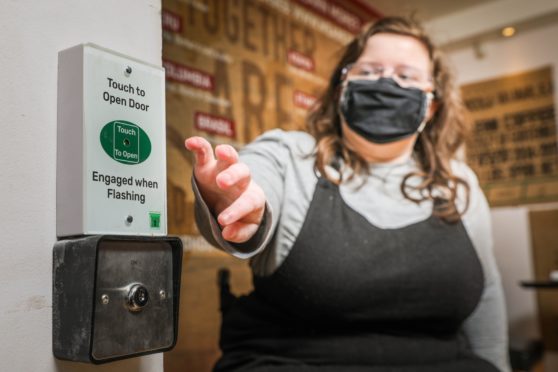
Lisa continued: “Because we do so many of the work placements, it’s just really good for all the staff to have an understanding around the issues.
“A lot of places do things like autism awareness training, which are quite often run by neurotypical people who are not autistic. It quite often highlights all the problems that are commonly associated with autism and how you work around these problems – it doesn’t often focus on the benefits and what autistic people are really good at and it doesn’t often have a strength-based approach.
“We did neurodiversity training with neurodiversity international, led by Jude Morrow, who is a TedX speaker and author. He’s also autistic and very successful. He speaks from an autistic-led point of view.
“It’s just making sure that the team understand the things that people can struggle with and how to work around it, but also here are the good things and how to encourage them, as well as helping them feel valued and confident.”
Erin also adds: “Training like this is so important! Especially now with people experiencing Covid-related challenges. It will improve customer interaction in general but will help those who struggle to communicate to feel understood and listened to which will ease frustration and awkwardness for both customers and Zest staff.”
Continuous training
The training for staff at Zest isn’t just a one-time thing nor for one issue, as Lisa ensures her staff training is continuous so that if someone is struggling with mental health issues one morning, they can still work in the cafe but they don’t need to feel the pressure they normally would in their role.
Lisa continued: “We keep training everybody continuously, up to supervising level. If someone has depression or anxiety and they get up in the morning and they have a shift but they don’t feel able to cope with it, they can still come in but they tell their colleagues they’re having a really bad day.
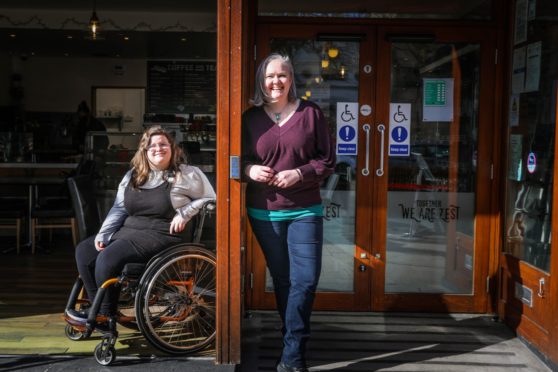
“We’ll then change the job design so that if they were going to be supervising, they can wash dishes and do a different, non-customer-facing job, then someone else can step up and take over.
“If everyone is able to run a shift, do the ordering and look after the health and safety then they can swap in and out of job roles quite fluidly and have the confidence to do that and feel comfortable enough to say to their colleagues if they’re not feeling too great. Having that really open culture is normal, so people don’t feel out of place.”
Communication
Communication is also key when it comes to working in a cafe, and as Lisa has been suffering from Long Covid (which she caught outwith the business environment), having her staff well versed in communication issues has also been of benefit to her.
“We’ve done a speech and language therapy workshop, which was online and really easy to do,” Lisa said.
“All of the staff did it as there are so many people who struggle with communication issues because they may have things like cystic fibrosis or dementia, or a whole range of different things. It really just gives the staff confidence on how to treat them with respect and how to help them without being patronising – it’s a really good workshop.
“For me with my Long Covid, there’s sometimes brain fog and you just can’t get words out or random words pop in there that make no sense, or I just can’t concentrate to get a sentence out.
“But the staff are able to help and translate for me – I’m one of the lucky ones because I’ve got a super supportive team that knows how to support me, because they’re trained in that. But I can imagine it’s really hard for people who don’t have that team around them.”
Kickstart
Another investment for the business this year will be advertising roles in the cafe through the UK Government’s Kickstart scheme, which helps 16-24-year-olds who are at risk of long-term unemployment find six-month work placements.
“We are going to be doing the government scheme Kickstart. We’ve got an advert going out this week on the Jobcentre Plus for one person to join us for six months, and we’ll be doing a lot of teaching and training with them.
“But we will be doing inclusive recruitment – I don’t just pop an advert in to see what comes back, I actively put it out to all the agencies so that people who are less confident in applying for jobs or maybe haven’t thought ‘I’ll be able to do that’ are able to. Then we get more people applying from more diverse backgrounds.
“It doesn’t actually take that much longer to do inclusive recruitment, but I think a lot of employers maybe aren’t aware how to do it, or that it’s good practice to do it that way.
“I’ve had a good response from that actually – a lot of people with disabilities have got in touch and said they’d like to apply and they’ve not felt confident before.”
